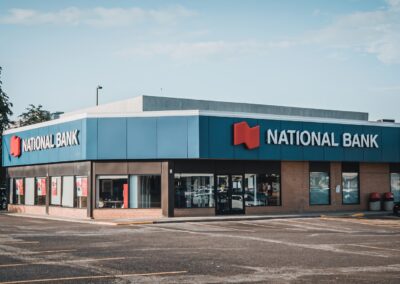Overcoming Barriers in Technological Investment
Challenges in Building Technological Infrastructure
The need for significant technological infrastructure and investment can be a barrier to entry for smaller fintech startups. Establishing a robust technological foundation is essential for the development and deployment of fintech solutions, but it requires substantial financial resources and expertise. This challenge is particularly pronounced in regions like Saudi Arabia and the UAE, where the fintech industry is rapidly growing, but smaller startups may struggle to keep pace with larger, more established companies.
Technological infrastructure encompasses various components, including data centers, cybersecurity measures, software development platforms, and networking capabilities. Each of these elements is crucial for ensuring the reliability, security, and scalability of fintech services. However, acquiring and maintaining this infrastructure can be prohibitively expensive for small startups. High initial costs and ongoing maintenance expenses can drain financial resources, making it difficult for these companies to compete with larger firms.
In Saudi Arabia, the government is actively supporting fintech innovation through initiatives like the Financial Sector Development Program, which aims to enhance the financial ecosystem and promote digital transformation. Similarly, the UAE is investing in fintech through the Dubai International Financial Centre (DIFC) and the Abu Dhabi Global Market (ADGM), both of which offer supportive environments for fintech startups. Despite these efforts, the challenge of securing adequate technological infrastructure remains a significant hurdle for smaller players in the market.
Innovative Solutions for Infrastructure Challenges
To overcome the barriers posed by the need for significant technological infrastructure, fintech startups can explore several innovative solutions. One approach is to leverage cloud computing services, which offer scalable and cost-effective alternatives to traditional data centers. Cloud platforms such as Amazon Web Services (AWS), Microsoft Azure, and Google Cloud provide fintech startups with access to advanced technologies without the need for large upfront investments in hardware and software.
By using cloud-based infrastructure, fintech startups can quickly scale their operations to meet growing demand. This flexibility is particularly beneficial in the dynamic fintech industry, where the ability to rapidly adapt to changing market conditions can be a critical success factor. Additionally, cloud providers offer robust security features and compliance certifications, helping startups to ensure the integrity and confidentiality of their data.
In Dubai, fintech startups are increasingly adopting cloud solutions to streamline their operations and reduce costs. The Dubai Smart City initiative, which aims to transform Dubai into a leading digital hub, promotes the use of cloud computing and other advanced technologies to drive innovation. Similarly, Saudi Arabia’s Vision 2030 emphasizes the importance of digital infrastructure in achieving economic diversification and enhancing the competitiveness of the financial sector.
Partnerships and Collaborations to Enhance Technological Capabilities
Another effective strategy for overcoming infrastructure challenges is to form partnerships and collaborations with established technology companies and financial institutions. These partnerships can provide fintech startups with access to essential resources, expertise, and technologies, enabling them to build and maintain robust technological infrastructure. By leveraging the strengths of their partners, startups can focus on developing innovative solutions and expanding their market presence.
In the UAE, the DIFC and ADGM have created ecosystems that facilitate collaboration between fintech startups, traditional financial institutions, and technology providers. These ecosystems foster innovation by providing startups with access to mentoring, funding, and technological resources. For example, the DIFC FinTech Hive offers a collaborative environment where startups can work alongside industry experts to refine their products and services.
Saudi Arabia is also promoting collaboration through initiatives like the SAMA Regulatory Sandbox, which allows fintech startups to test their solutions in a controlled environment with support from regulators and industry stakeholders. By participating in the sandbox, startups can gain valuable insights into regulatory requirements and market dynamics, helping them to build more robust and compliant technological infrastructure.
Strategic Investments for Sustainable Growth
Securing Funding for Technological Development
Securing adequate funding is crucial for fintech startups to invest in the technological infrastructure needed for sustainable growth. Access to capital enables startups to acquire the necessary hardware, software, and talent to build and maintain their infrastructure. However, attracting investment can be challenging, especially for early-stage startups with limited track records.
In Saudi Arabia, the government and private sector are providing various funding opportunities for fintech startups. The Saudi Arabian General Investment Authority (SAGIA) offers incentives and support for foreign and domestic investors, while venture capital firms and angel investors are increasingly interested in the fintech sector. Additionally, programs like the Saudi Fintech Initiative aim to enhance the funding landscape for startups by connecting them with investors and providing mentorship and resources.
The UAE also offers a supportive funding environment for fintech startups. The DIFC and ADGM have established fintech funds to provide financial support to innovative startups. Furthermore, the UAE’s robust venture capital ecosystem offers numerous opportunities for startups to secure funding. By tapping into these resources, fintech startups can invest in the technological infrastructure needed to scale their operations and compete in the market.
Developing In-House Expertise
Building a skilled workforce is another critical aspect of developing and maintaining technological infrastructure. Fintech startups need talented professionals with expertise in software development, cybersecurity, data analytics, and other key areas to ensure the reliability and security of their services. Investing in talent development and retention is essential for long-term success.
In Riyadh, educational institutions and training programs are helping to develop a skilled workforce for the fintech sector. Universities and technical institutes are offering courses and certifications in fintech-related fields, while initiatives like the Saudi Digital Academy provide specialized training for technology professionals. These efforts are creating a pipeline of talent that fintech startups can leverage to build and maintain their technological infrastructure.
Similarly, the UAE is investing in talent development through initiatives like the Dubai Future Accelerators, which connects startups with global experts and mentors. By participating in these programs, fintech startups can gain access to the knowledge and skills needed to build cutting-edge technological infrastructure. Additionally, the UAE’s diverse and multicultural workforce provides a rich pool of talent for fintech companies.
Conclusion
In conclusion, the need for significant technological infrastructure and investment is a major challenge for fintech startups, but it can be overcome through innovative solutions, strategic partnerships, and targeted investments. In Saudi Arabia and the UAE, government initiatives, supportive regulatory environments, and access to funding and talent are helping fintech startups to build the infrastructure needed for sustainable growth. By leveraging cloud computing, forming collaborations, and investing in talent development, fintech startups can overcome the barriers to entry and thrive in the competitive financial sector. As these regions continue to embrace fintech innovation, the successful development and deployment of technological infrastructure will play a crucial role in shaping the future of financial services.
—
#FintechStartups #TechnologicalInfrastructure #InvestmentInFintech #ModernTechnology #UAEInnovation #SaudiArabiaFintech #BusinessSuccess























